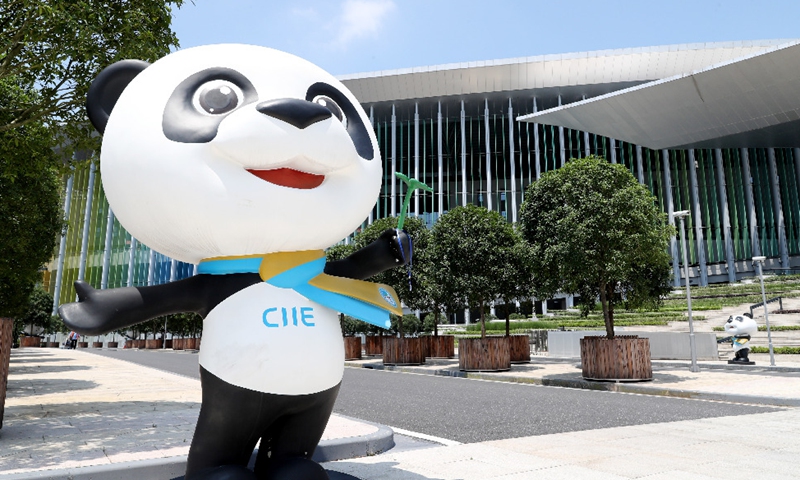Import expo shows trust in China's economy: expert
Source: Xinhua Published: 2020/10/17 8:28:43

Jinbao, mascot of China International Import Expo (CIIE), stands at the National Exhibition and Convention Center (Shanghai), the main venue of the first CIIE, in Shanghai, east China, July 26, 2019.File photo:Xinhua
The upcoming third annual China International Import Expo (CIIE) is a demonstration of the confidence countries and enterprises have in the vitality of the Chinese economy after the country overcomes the COVID-19 pandemic, an expert said on Friday.
Cavince Adhere, a Kenyan scholar on China-Africa relations, observed that with more than 1,400 enterprises raving up to exhibit their products and services, the 2020 edition of CIIE builds on the resilience and recovery of the world's second-largest economy.
"The expo is a continuation of Chinese economic reforms of opening up and promotion of globalization. It captures the aspirations of multilateralism while firming up the commitment of China to open up the market to the world," Adhere told Xinhua in an interview.
This year, more than 180 countries will participate in the expo.
"Kenyan enterprises have participated in the previous CIIE and the country will leverage on the upcoming edition to further scout for export opportunities to China," he noted.
Kenya and China in 2018 signed sanitary and phytosanitary agreements to facilitate entry of agricultural produce into the Chinese market.

File photo:VCG
"Like China, Kenya is one of the countries that are projected to post positive economic growth despite the challenges occasioned by COVID-19. However, the economic toll on Kenya will require much effort and new strategies to ameliorate," he said.
Kenyan sectors to be featured in the 2020 expo include tourism, agriculture, financial services and technology.
"To maximally gain from trade with China, both Nairobi and Beijing need to effect a number of things. The first concerns product quality. China has opened its trading rooms to all countries around the world," said Adhere.
Adhere said the CIIE, scheduled Nov. 5 to 10, will take targeted investments into Kenya's production lines to meet and exceed quality thresholds set by China including sanitation and packaging.
"Investments in language learning and people-to-people exchanges will significantly enhance the ability of Kenyan enterprises to effectively target and penetrate the Chinese market," he added.